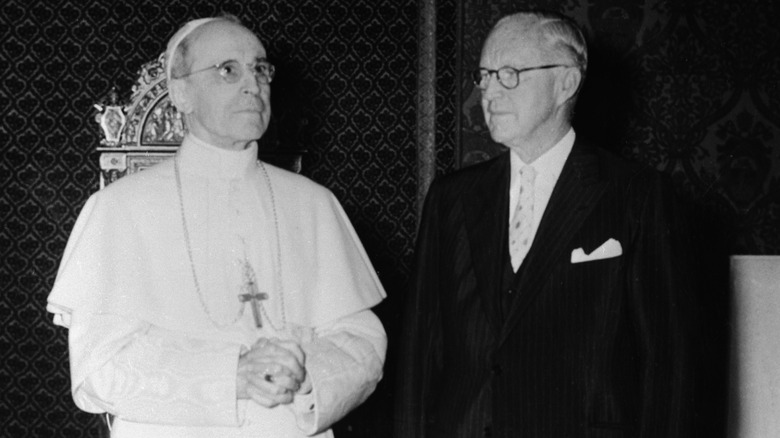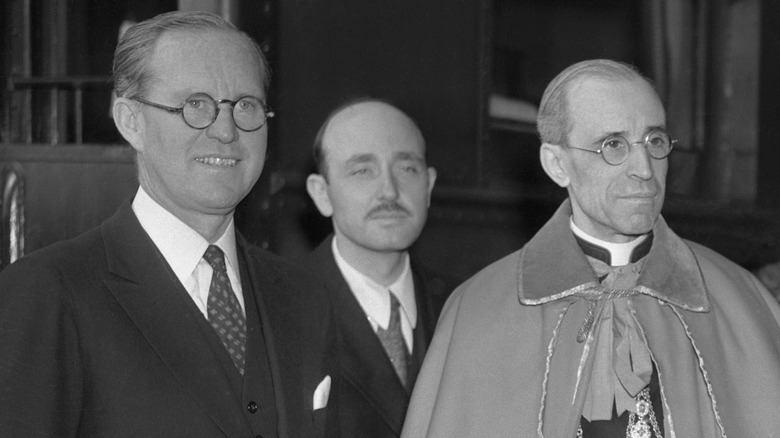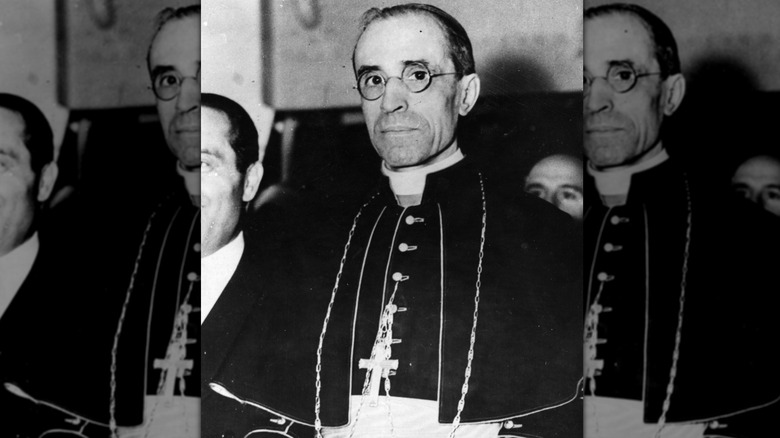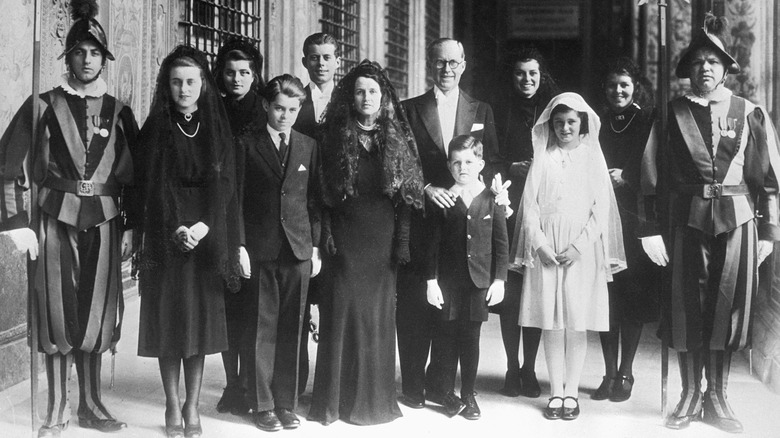The True Story Of The Kennedy Family's Relationship With Pope Pius XII
In 1960, anti-Catholicism was still a common prejudice in America, and it was a significant roadblock for John F. Kennedy on his way to the White House. Per the JFK Presidential Library and Museum, he used various speeches to speak out against the religious bias he argued was keeping one-third of Americans from high office. He also tried to assuage conservative Catholics who had strayed into the Republican camp after World War II.
JFK also sought to affirm his independence from the Vatican. There was paranoia in America about any Catholic president potentially being a fifth columnist, someone who would take orders from the pope up to and including violating religious liberty (per History). In his most famous speech on the subject, the politician strongly denied such conspiracy theories. "I believe in an America where the separation of church and state is absolute," he said at the Greater Houston Ministerial Association, "where no Catholic prelate would tell the President — should he be Catholic — how to act, and no Protestant minister would tell his parishioners for whom to vote."
There was never a risk that John F. Kennedy would take marching orders from the pope or any senior clergyman. But he did have a personal history with Pius XII, the reigning pontiff from 1939 to just before his election bid. It was, if not a particularly close association, one that went back generations — his father, Joseph P. Kennedy, knew Pius from the time he was a cardinal, according to the National Catholic Register. The elder Kennedy and his son were on the scene for Pius' coronation, and he even left a personal touch on John's wedding.
The future Pius XII met Joseph Kennedy while on a diplomatic mission to America
Before he became pope, Pius XII was Eugenio Pacelli. Per Britannica, he was, not unlike the Kennedys — born into a family with a long history of service, in Pacelli's case to the Vatican. He entered the priesthood in 1899, and by the end of World War I, he was a Vatican ambassador to Bavaria. By 1930, he was Cardinal Pacelli, secretary of state, and five years later he was again promoted to papal chamberlain. He was still in that office when he visited the United States on a papal mission in 1936.
At that time, Joseph Kennedy was a commissioner in the federal government as well as the patriarch of a prominent American Catholic family. And so, according to the National Catholic Register, Pacelli included a visit to the Kennedy home in Bronxville on his November itinerary. Kennedy Sr. even personally escorted the cardinal from Hyde Park. This visit appears to have been a social one with little documentation — Rose Kennedy didn't even date her impressions of the visit in her diary. She did record that Pacelli was a patient and kindly man who indulged the many questions of the Kennedy children and gave the family a benediction. While it cannot be confirmed, the impression given by Rose's diary is that the family had all their children there but one — John, who was attending Harvard at the time. He would have his own private audience with Pacelli while touring Europe as a student in 1937, a boon almost certainly due to his father. Pacelli remembered the Kennedys and asked after them.
Pius XII wrote to Joseph Kennedy about the threat of Nazism as a cardinal
One of the great controversies of Pius XII's papacy is his attitude toward Nazi Germany. He was an admitted Germanophile from his time as a diplomat to Bavaria, and as papal chamberlain, he was involved in the drafting of concordats with the fascist regimes of Germany and Italy. Per Britannica, Pius XII was eager, even desperate, to be an instrument of peace when he became pope, and his efforts to stand above the conflicts of World War II have been taken as indifference by later critics. He has been called the "Pope of Silence" in regard to his approach to the Holocaust, and a push for sainthood to be bestowed on Pius has inspired fierce criticism (per the Times of Israel).
But correspondence between Pius and Joseph Kennedy, uncovered in the early 2000s, has complicated that picture of Pius. Per The Irish Times, Pius wrote to his friend in 1938, when he was still Cardinal Eugenio Pacelli. He had prepared a report outlining his personal feelings toward Nazism and asked that Kennedy Sr. — then the United States ambassador to Britain — send it on to President Franklin Roosevelt. In the report, Pacelli declared that compromise between the Vatican and Germany was "out of the question" and that he saw the Nazis as a threat to religious liberty.
Kennedy Sr. was more equivocal than Pacelli about Nazism and would leave his post in 1940 after his pessimism about the war was published (per PBS). When Pacelli was first elected pope, the politician wrote to Roosevelt that the new pontiff was unduly prejudiced against the Nazis for their "pagan" associations.
The Kennedys attended Pius' coronation, and he sent a blessing to JFK's wedding
Cardinal Eugenio Pacelli became Pope Pius XII on March 2, 1939, and his coronation was held 10 days later. On hand to witness the accession was Joseph Kennedy. The American ambassador to Britain attended the coronation — the first of its kind in over a century — as a personal representative of President Franklin Roosevelt. The entire Kennedy clan was invited by Pius himself, who also granted the family patriarch a series of private audiences. It was from these meetings that Joseph Kennedy gained his assumption that the new pope was too hostile to the Nazis. He encouraged Pius to keep such reservations private.
John F. Kennedy was with his family for the coronation, an event he confessed in letters made him feel "important." He reported back to college friends that Pius not only gave him and his father communion but also gave Ted Kennedy his first communion ever, "the first time that a pope has ever done this in the last couple hundred years."
The future president and the pope would meet in person two more times, once in 1951, and again in 1955 at the pope's personal residence. In between the two meetings, John married Jacqueline Bouvier. A New England society wedding might not seem the kind of affair popes take a personal interest in, but the Kennedy family's history with Pius XII made all the difference — he sent a personal blessing to be read at the ceremony.



